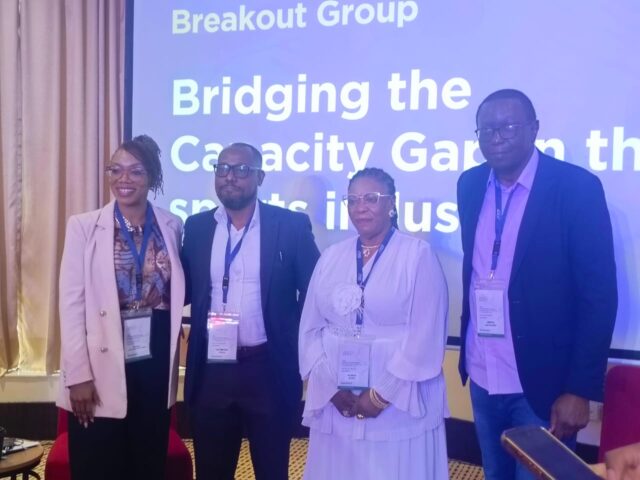The Sports Africa Investment Summit 2025 serves as a platform to drive meaningful conversations and actionable strategies for advancing the sports industry across Africa.
Plenary 1: Inclusivity, Impact, and Sustainability in Sports focuses on closing the capacity gap by fostering greater inclusivity, maximizing the economic and social impact of sports, and ensuring long-term sustainability.
Read Also: PFAN Appoints Caretaker Committees For Adamawa, Plateau State Chapters
In Nigeria, despite immense talent and passion for sports, challenges such as inadequate infrastructure, limited funding, and governance issues continue to hinder growth. Bridging this gap requires a multi-faceted approach, integrating investment, technology, and policy reforms to create a thriving sports ecosystem.
Key Strategies for Bridging the Capacity Gap
1. Infrastructure Development
Revamping Existing Facilities: Many stadiums and training centers in Nigeria are in poor condition. The government should renovate key sports venues and ensure maintenance.
Community Sports Hubs: Establishing well-equipped sports centers at the grassroots level will encourage mass participation.
Private Investment in Infrastructure: Encouraging private sector involvement through incentives can lead to better-managed and modern sports facilities.
2. Talent Development & Grassroots Programs
School Sports Revival: Schools are a breeding ground for talent, but sports participation has declined. Government and corporate sponsorship can bring back inter-school competitions.
Scouting & Development Academies: Establishing talent identification programs and academies in different regions will help discover and nurture young athletes.
Coaching & Technical Training: Nigeria needs more professional coaches, referees, and technical staff. Training programs and international exposure can help improve standards.
3. Funding & Investment
Public-Private Partnerships (PPP): Collaboration between the government, private investors, and foreign sports organizations can inject funds into the industry.
Corporate Sponsorships: Brands like MTN, Guinness, and Access Bank have sponsored sports before. Expanding corporate sponsorships can boost funding.
Crowdfunding & Grants: Seeking international grants and crowdfunding platforms can help support sports development.
4. Technology & Digital Transformation
Sports Analytics & Performance Tracking: Nigerian teams and athletes should leverage data analytics for training and strategy development.
Esports & Digital Expansion: With the rise of gaming and online streaming, Nigeria can explore esports as a new frontier for youth engagement.
Social Media & Branding: Athletes and clubs should maximize digital platforms for sponsorships, fan engagement, and revenue generation.
5. Governance & Policy Implementation
Reforming Sports Federations: The Nigerian Football Federation (NFF) and other sports bodies need transparent leadership to manage funds and development projects effectively.
Anti-Corruption Measures: Ensuring accountability in fund allocation and management will attract more investors.
Long-Term Development Plan: The government should create a structured 10–20-year sports development roadmap, similar to what countries like South Africa have done.
6. Inclusion & Diversity
Women’s Sports Development: More investment is needed in women’s leagues, especially in football, athletics, and basketball.
Para-Sports Support: Special programs should be put in place to support disabled athletes and para-sports competitions.
Rural & Northern Nigeria Engagement: Many talents come from rural areas, but they lack opportunities. Expanding sports programs in underserved regions will bridge this gap.
7. International Collaboration & Exposure
Foreign Training Camps: Sending athletes to train abroad or inviting foreign experts can enhance skills and exposure.
Sports Exchange Programs: Partnering with sports bodies in Europe and America can create exchange opportunities for young athletes.
Leveraging the Nigerian Diaspora: Many Nigerian-born athletes succeed abroad. Engaging them in local development programs can bring expertise back home.
—
Key Focus Sports for Nigeria
Football: Nigeria’s biggest sport, but the league system (NPFL) needs restructuring to attract investment and TV rights deals.
Basketball: Nigeria’s D’Tigers and D’Tigress have global recognition, yet local basketball development remains weak.
Athletics: Nigeria has a strong history in sprinting but needs better track and field facilities and training programs.
Combat Sports (Boxing, MMA): There’s rising interest in boxing and MMA, with Nigerian fighters like Israel Adesanya and Kamaru Usman leading globally.
Esports & Tech-Driven Sports: A fast-growing sector that could attract Nigeria’s youth and digital investors.
—
Final Thoughts
Nigeria has an abundance of talent, but without proper investment, infrastructure, and governance, the sports industry cannot reach its full potential. By focusing on grassroots development, corporate partnerships, digital transformation, and transparency, Nigeria can bridge the capacity gap and establish itself as a global sports powerhouse.
The Sports Africa Investment Summit 2025 provides an opportunity to turn these discussions into actionable plans, ensuring that inclusivity, impact, and sustainability remain at the heart of sports development in Nigeria and across the continent.









